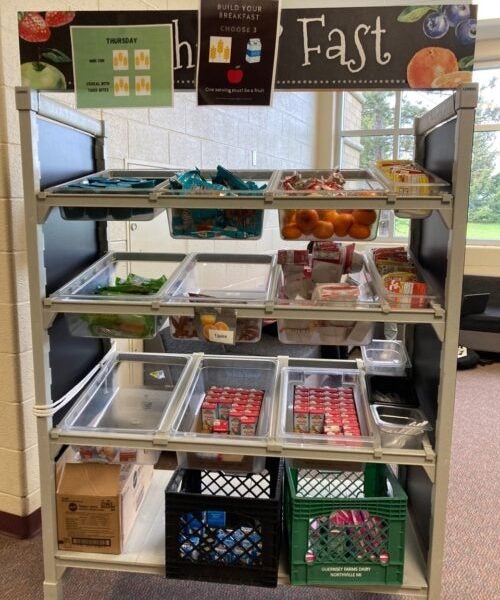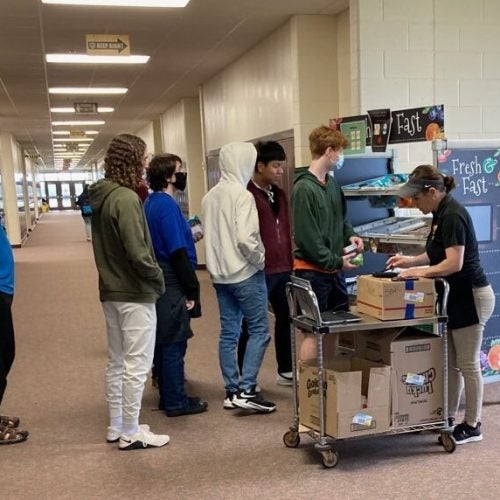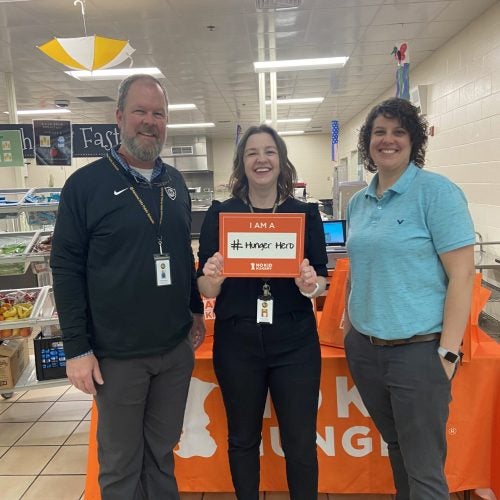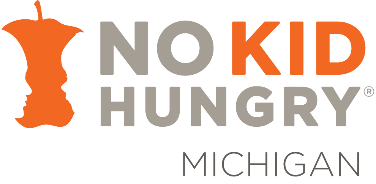New! Click Below to view the video from Milk Means More and ABC 4 featuring Kenowa Hills!
No Kid Hungry Michigan is excited to present the next entry in a new blog series highlighting the 2022 No Kid Hungry Michigan School Breakfast Heroes. Join us to learn more about how these Heroes throughout Michigan’s school kitchens and cafeterias increased breakfast participation within their schools and districts, and see what steps you can take to increase breakfast participation in your school. For the complete list of 2022 No Kid Hungry Michigan School Breakfast Heroes, please visit our page here.
Second Chance Breakfast a Success at Kenowa Hills High
Nestled within the city of Grand Rapids, Kenowa Hills High School went from serving an average of 91 breakfast meals a day in 2019 to 536 breakfast meals in 2021. An impressive increase, No Kid Hungry Michigan’s senior program manager Mindy Grant recently interviewed Kenowa Hills Director of Food Service Shanna Williams to learn more about the strategies implemented and lessons learned.
Just prior to Williams coming to Kenowa Hills shortly before the start of the pandemic, the high school planned on implementing a Saecond Chance Breakfast, also known as Breakfast After the Bell, in order to increase breakfast participation. Breakfast was only served out of the cafeteria in the morning, limiting participation.
There were a few changes and factors that Williams had to consider when students began to return back to school in full. Perhaps most importantly, Kenowa Hills High School would be serving every student who wanted breakfast for free utilizing the USDA waiver flexibilities available*, instead of just the typical paid breakfast model. Williams noted, “[The waivers] are the main contributing factor [for increasing meal participation] and certainly plays the biggest role.”
Continuing, Williams explained, “Part of what also prompted [the original Second Chance Breakfast Model] was bussing and scheduling, because what started happening, especially with things like staffing shortages and scheduling and things, was that kids were going to get to school so late that we were concerned about the volume of students being able to get breakfast.” Williams admitted, “Before COVID the participation wasn’t that high, so it was easier, but when we started thinking about 600 kids possibly grabbing breakfast, there was no way we could do it in the cafeteria in the time frame that we had from when they got dropped off if they took a bus. Administration was very aware and on board with that.”
The solution? Kenowa Hills High School already had two breakfast carts available due to implementing the early stages of Second Chance Breakfast. Williams explained, “We took those carts, and we sort of combined the idea of Second Chance Breakfast and the carts. We don’t serve breakfast at the high school until between 8:00 AM and 9:00 AM depending on where you are. Williams explained, “These kids are coming and maybe they ate breakfast at home at 6:30 AM and they’re hungry again. Or, they didn’t eat and don’t want to eat the minute they walk into school and we use [Second Chance Breakfast] more like a break for the kids so the students can leave their class. They can go to the cart, they get a little bit of a break from school and then they can bring their breakfast back into the classroom. I think one of the biggest pieces [for increasing breakfast participation] is that late breakfast.”
The reinvigorated Second Chance Breakfast model initially started when students were back in the high school and COVID protocols were most stringent. While COVID protocols such as social distancing have now been relaxed, teachers and students still follow the Second Chance Breakfast model. She also shared that a supportive administration really made a positive difference in program operations. Continuing her praise for the flexibility and communication of the administration to make sure meal operations went successfully, Williams noted, “If [administration] is changing a schedule, if they’re moving lunch around, they’re coming to us first and making sure it works, which is something I have not experienced before in school food and is a big part of [success].”
In terms of adjusting cafeteria staff to prepare for the large increase of meals, Williams shared that there were a few challenges, including adjusting schedules to make sure there were enough staff to cook and serve, and actuallyusing the cart itself. “It’s a lot to move around because they are feeding 500 children,” said Williams.
However, Williams explained that staff have warmed up to the model, sharing, “Now, they actually love it! When we shifted positions around this year and had to fill a position for someone who retired, [a staff member] came to me and wanted to move up their hours to take a different position. She came to me and exclaimed, ‘but I’m not doing that If I lose the breakfast cart!’”.
With this process designed with all members of the school community in mind, Kenowa Hills High School continues to use the Second Chance Breakfast Model each day. Not only is this used in the high school, but in all of the schools within the Kenowa Hills district as well. For their efforts, No Kid Hungry Michigan recognized Kenowa Hills High School with a certificate of recognition as well as a $250 stipend to be used to celebrate staff. Congrats!
Interested in Second Chance Breakfast and Breakfast After the Bell? You can find No Kid Hungry Center for Best Practices Resources here.
*In the interview, WIlliams noted that USDA wavier flexibility allowed Kenowa High to serve meals in SY 2021-22, allowing schools to offer all students free meals at the higher Summer Food Service Program reimbursement rates. Recently, Congress did not include a provision to extend the USDA’s authority to issue nationwide child nutrition waivers. Without this Congressional authority, the USDA’s ability to offer flexibility is limited. For more on this, and to read No Kid Hungry Senior Vice President Lisa Davis’s full statement, click here.




